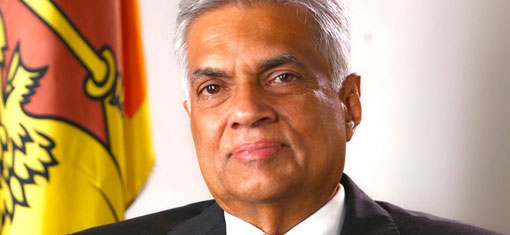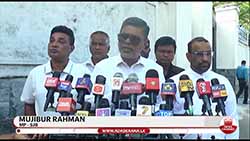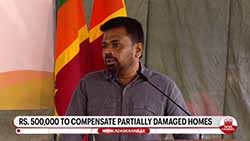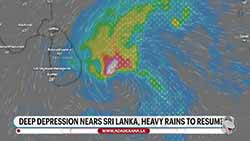Prime Minister tells UK to stay in the EU
June 15, 2016 09:54 am
If the UK leaves the EU now it would put the country’s economic success at risk. It would be, in cricket parlance, a hit wicket, and it is therefore not surprising that your allies and friends have expressed their anxieties and concerns, Prime Minister Ranil Wickremasinghe said.
The Prime Minister contributing an Opinion article to a British Newspaper stated that he is amazed at a country which seems inclined to throw away its secure present for an uncertain future. Exiting the European single market means standing in a queue while a country like Sri Lanka enters into agreements with the above-named countries, he added.
Full article that appeared on inews.co.uk
As a politician who was first elected to Government in 1977, I have closely observed key political developments in the global landscape over the past 40 years or so.
To name a few: the Chinese economic reforms initiated by Deng Xiaoping in 1978, which gradually integrated China into the world economy; the economic reforms in India of Prime Minister Narasimha Rao which led to India becoming an impressive regional power; and the establishment of a European single market.
The outcome of these initiatives was the emergence of a new global economic order promoting open markets and free trade among the key players – the US, the EU, China, Japan and India. Today we all belong to this new global order, in which trade is not confined to national boundaries.
As a result, we are all dependent on the global economy recovering from the financial crisis of 2008.
Global macro-economic stability is of vital importance, for example, to us in Sri Lanka.
After three decades of terrorism, internal conflict and divisive politics, we have embarked on a process of reconciliation, the upholding of human rights, the consolidation of democracy and the strengthening of our economic base by joining the global market.
The success of our strategy to diversify our exports earnings and improve our balance of trade depends on a stable global economy.
Therefore the future of the European single market, which accounts for more than 30 per cent of our export trade – with the balance of trade in our favour – is of critical concern to us, as its disruption would have global consequences.
The IMF Spring Meeting of 2016 concluded that the outlook for global economic growth has worsened, and one of the greatest risks to the health of the global economy is the possible exit of the UK from the EU, which would potentially lead to further financial turbulence.
We in Sri Lanka – as well as many other Asian countries – cannot afford further financial turbulence and another global economic downturn.
So we are very concerned about the probable impact of a British exit from the EU – on the global economy, on Sri Lanka, and on the UK.
The IMF’s negative forecasts about the risks of a British exit are reinforced by the UK Treasury’s prediction of huge revenue losses to the British government, and the projection that each British citizen would be poorer by £4,300 by 2030.
This Treasury forecast cannot be ignored or cast aside with a few derogatory remarks.
It is a wide-ranging analysis that requires serious consideration. The IMF World Economic Outlook and the Treasury analysis are backed by a large number of other organisations, such as the OECD, the Institute of Fiscal Studies and a range of banks and businesses.
The UK has structured a European single market which gives them the best of both worlds. It is a single market of 500m people incorporating both the Eurozone and a Sterling area – two of the five IMF reserve currencies.
Last year, London overtook New York once again to become the world’s foremost financial centre; the EU is the world’s largest economy, with more than 20 per cent of global GDP.
It is the world’s largest trading bloc, with 15 per cent of the world’s trade in goods and services.
It is also the biggest export market for more than 80 countries, including Sri Lanka.
So the economic consequences of the disruption that could be caused by the UK pulling out of the EU would have an impact even on our part of the world.
Those of you who favour leaving contend that the UK could enter into a series of free trade agreements with the EU, the US, Asia and Commonwealth countries, and thereby cushion the impact of losing access to the European single market.
In Sri Lanka, we suffered the consequences of losing the GSP+, a preferential trade deal with the EU, in the late 2000s. Going by our experience, the adverse impact off a UK pull-out would be far greater.
Today, we, in Sri Lanka, are on the verge of re-applying for the GSP+; we are negotiating an economic and technology agreement with India, and discussing trade deals with China, Singapore and the US.
We have to follow a convoluted path to trade development in which individual negotiations have become our only option, given that a single market for , our region, South Asia, is not feasible.
So I am amazed at a country which seems inclined to throw away its secure present for an uncertain future. Exiting the European single market means standing in a queue while a country like Sri Lanka enters into agreements with the above-named countries.
Those who promote leaving the EU have not been able to rebut the analyses, which mostly predict financial tumult and economic downturn.
Modern history has no parallel to the dynamics of the UK, a country that built up and maintained economic success, from the days of empire to the European single market.
To leave the EU now would put that very position at risk. It would be, in cricket parlance, a hit wicket, and it is therefore not surprising that your allies and friends have expressed their anxieties and concerns.
Prime Minister Margaret Thatcher paid a visit to Sri Lanka 31 years ago, in April 1985.
I was present when President Jayewardene quoted Hamlet to her: he repeated Polonius’s advice to Laertes: “Those friends thou hast, and their adoption tried, grapple them unto thy soul with hoops of steel.”
The decision the voters of the UK must on 23 June is as momentous as that taken by the wartime government on 28 May 1940, when there were voices calling for negotiation with Germany.
Churchill was cheered for his decision to carry on without changing course. We wish the people of UK all strength to make the correct decision on 23 June.












